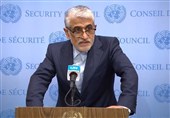Russia, China, Pakistan Defy Snapback: Iranian Diplomat
TEHRAN (Tasnim) – Iranian Deputy Foreign Minister for Legal and International Affairs Kazem Gharibabadi highlighted the opposition of Russia, China, and Pakistan to the re-imposition of UN sanctions on Iran, describing their stance as a significant point of convergence with Tehran.
Speaking to reporters on the sidelines of the 25th summit of the Shanghai Cooperation Organization (SCO) in Tianjin, China, on Monday, Gharibabadi said the gathering provides an important opportunity for consultations on Iran’s nuclear issue.
He noted that both China and Russia, as permanent members of the UN Security Council, and Pakistan, as a non-permanent member, share common ground with Iran in rejecting the so-called snapback mechanism of the 2015 nuclear deal and the revival of canceled Security Council sanctions.
The diplomat explained that Iran’s proposals were reflected in the SCO leaders’ final declaration, which included several important provisions.
One article strongly condemned the acts of aggression by the Zionist regime and the US against Iran, including attacks on its nuclear facilities that violate international law, he said, adding, “The explicit mention of both the Zionist regime and the US in the declaration is highly significant.”
Another article addressed the UN Security Council Resolution 2231, with SCO members underscoring that it must be implemented fully and not selectively, he said. Gharibabadi underlined that this means the European states cannot neglect their own obligations under the resolution while seeking to selectively enforce provisions related to snapback.
Commenting on recent European actions, Gharibabadi said, “The move by Europeans to send a notification to activate the snapback is unlawful and lacks legal basis. We have made this clear to them.” He lamented that certain international organizations act within a political framework rather than a legal one.
The deputy foreign minister emphasized that Iran has issued a formal statement in response, while also urging Europe to use the time frame they themselves outlined --about 20 to 30 days-- to correct their mistake. He warned that should the European governments move toward reinstating sanctions, Iran will adopt a firm and proportionate response.
“This is not only an opportunity for Iran,” Gharibabadi concluded, “but also a chance for the Europeans to reconsider their unlawful course of action and rectify their error.”
In a new escalation, the European troika of the UK, France, and Germany (EU3) has formally sent a letter to the UN Security Council announcing the activation of the so-called snapback mechanism, a step that seeks to re-impose international sanctions on Iran. The announcement marks the most serious move yet by the three European states against Tehran since the US withdrew from the JCPOA in 2018.
Iranian officials have denounced the measure as illegal and politically motivated, stressing that Europe has no standing to invoke snapback after failing to fulfill its own commitments under the nuclear deal. Tehran has warned that such a step will compel a decisive reciprocal response, undermine cooperation with the IAEA, and severely damage the credibility of the Security Council itself.






